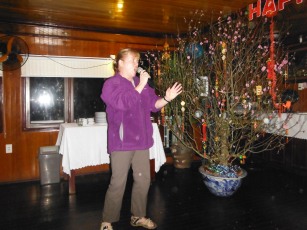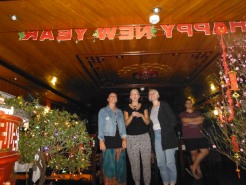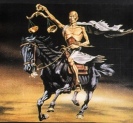Taking the plunge:
It may well have been a mid-life crisis, but I prefer to think of it, albeit euphemistically, as a ‘career break’. That sounds so much more planned, much less reckless and sort of age appropriate than say a ‘gap year’! Nearer fifty than forty in chronological age (but with no idea how that passing of the decades crept up on me) and coming to the end of a contract at work it increasingly dawned on me that there was (and indeed is) so much that I still wanted to do. That big wide world out there cries out to be explored, and I face a diminishing numbers of healthy years ahead in which to do it. There is never a good time to jack it all in and go off with a red spotted handkerchief containing all your worldly goods knotted on a stick and head into the great unknown. I can think of innumerable reasons why not to go. However, the logical extension of this is that, whatever the obstacles might seem to be, if any time of departure is problematic, you might just as well throw caution to the wind and go anyway. Who was it who first said ‘what the hell is always the right decision’? This realisation is strangely liberating, the trip of a lifetime just boils down to making the choice to do so and then do it. The practical challenges are nowhere near as problematic as simply making the mental leap. Just decide to go and then do so. Simples. The only essential things to bring on any adventure are surely an open mind, a sense of humour and the recognition that no experience in life is ever wasted, as long as it can subsequently be converted into a drunken anecdote. Well, that’s been my philosophy in life and it’s worked for me. (Having been away I’d also now include extra tube of antiseptic for insect bites, but that’s being a bit pedantic…)
Choosing a provider:
I knew I wanted to do an animal/ conservation based trip. I also set myself four criteria, I wanted to go to projects that: firstly, most needed the practical help and the financial donation; secondly, where my presence would not deprive a local person of a job; thirdly where there was transparency over how much of my money went to the project directly and finally where however basic the accommodation I wasn’t squashed into a dorm. I opted to travel with ACE because they offered projects which appeared to meet these criteria, and also I wanted to go away for three months and other providers projects seemed to be of shorter duration. I also liked the range of options available and bluntly thought the logistics would work better if I stuck with one provider making for a more streamlined trip. This certainly proved the case, movement between projects was seamless. I also wanted family at home to be able to contact me in the event of any emergency, and so that continuity gave peace of mind.
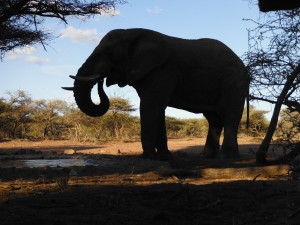
Elephant at Waterhole
Costs – why pay to volunteer?:
Financially, the break was not cheap. I agonised over this as it was a significant sum for me to find, and effectively I was blowing my savings on a relatively brief trip away. Peace of mind prior to departure came from an unlikely source. I confided to my hairdresser on my pre travel haircut that I was worried about this, it seemed astonishingly decadent, but when I told her what I’d spent, she laughed and said it was less than she’d forked out for her honeymoon. This was a great perspective giver. Why not blow it, the experience would be priceless. I also increasingly recognise that it is a reality that Volunteering these days is not providing your labour for free in return for board and accommodation, a payment is required. It is somewhat naïve to imagine you can parachute in on a specialist project and prove so indispensable that it can afford to first train you and then keep you. These projects are trying to survive on terrifyingly small budgets, money spent on hosting ‘volunteers’ would potentially have to be diverted directly from core conservation funds. Having been on the projects it becomes very apparent this cash injection from volunteers is really needed in order to carry on with their valuable conservation work. In some instances what you do when you get there, whilst help is obviously welcomed, seemed perhaps incidental – though in my experience this did vary from project to project. On arrival, this realisation initially did disappoint me; I wanted to feel I was making more of a practical difference. However, it helped me to put this in a wider context. In Zimbabwe when I arrived the project was so cash strapped they’d been unable to pay their staff for some time, against this backdrop you start to appreciate that with finances so fragile a non-paying volunteer is simply a drain on already vanishingly tiny resources. The request for payment is not cynical on the part of the projects; it is the only way they can survive. Volunteers who attend develop much greater awareness of the very real conservation challenges – well I certainly did – so this is part of an educational and dissemination process. In the projects I attended, the physical presence of people on the various game reserves acts as a deterrent to poachers. It also means that if a fence is broken or a flood destroys a road there are enough people around to put in the labour to carry out repairs. The work available does depend on what is happening at the time you get there. Ultimately, let’s face it; I wouldn’t have spontaneously parted with a wad of cash for any of the projects unless I was going to stay with them. Having spent time with them, I am persuaded that the money does enable the conservation work to continue, and I am happy to have been party to that.
Understanding the complexity of practical conservation:
I certainly learned much through direct observation, discussion and participation in projects that would have been impossible without visiting in person. Increasing insights gained actually challenged my original assumptions about what is effective conservation, but the debates were healthy. Questions I wrestled with included the role of hunting in conservation; whether dealing in rhino horn should be legalised; the acceptability of ‘rescuing’ individual orphaned or injured animals if that led to a future life in captivity; where is the greatest need for conservation – in ‘wild’ populations (if they even truly exist) or through working with private landowners.? A big shock for me in South Africa was the ubiquity of enormous Jurassic park style electric fences everywhere. There seemed to be not a scrap of land that wasn’t enclosed and owned by someone, the inescapable conclusion is perhaps that if you don’t work with potentially wealthy landowners, and persuade them e.g. of the benefits of tolerating (encouraging even) predators like leopard or cheetah on their properties, then there is no habitat left to preserve. I also became much more discerning about the difference between various charity and conservation projects. Some companies in Africa breed captive lions, stating their conservation aim is to ultimately create prides that can be released back into the wild. The publicity is enticing. I myself went to walk with lions whilst on an extra-curricular trip to Victoria Falls, and was seduced by the opportunity to get close to juveniles and lapped up the statistics about how the native lion population has decreased by 90% over the past 30 years. I can’t lie, it was amazing to see these powerful animals up close. However, I subsequently discovered (and felt very naive for not having worked this out myself) that the problem is not with reproducing lions, they are very easy to breed, the problem is with lack of habitat in a fenced land. All these adorable lion cubs have nowhere to go. Many will end up in canned hunting enterprises. This is the practice whereby captive breed lions are released into an enclosed area for a hunter to secure their trophy. The more extreme versions of this are allegedly illegal, but essential elements remain the same. It is a sobering thought that my money paid out to help with lion conservation in reality was probably funding a breeding programme that simply supplied hand reared cubs for a hunting franchise. I had some great photos of my ‘walk with the lions’ but I can’t look at them now. I tell the story as an illustration of how only through travel, debate, discussion do you start to appreciate the complexity of the conservation issues faced. If you are thinking of volunteering in Africa do your research, maybe check out this link too: volunteers in africa beware. There is often no one answer, and certainly no easy ones, but I feel much better informed, and more passionate than ever that the need for conservation of habitats is more urgent than ever.
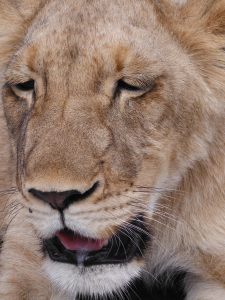
What projects to choose?
So I picked three projects, the idea being that each would enable me see animals in an increasingly wild environment. I chose Chipangali wildlife orphanage, because I wanted some hands on with animals, and also I deliberately chose a less popular project where I felt my contribution would have more impact. The second project I chose was Hanchi – largely because as a rider I have long fantasised about going on a horseback safari, and finally the Mofemedi rhino project. A new project which offered the chance potentially to see rhino on a massive property, and in my own small way perhaps help hold back the rising tide of water that may yet lead to their extinction.
You can find out the minutiae of these projects by reading the relevant blurb. I can talk for hours about my experience on all of them, but I will try and exercise restraint! What I will say is that all the projects delivered, although not always in the way I’d expected.
Chipangali:
At Chipangali I did indeed get up close and personal to animals. I had the opportunity to hand raise an orphan monkey, to work in enclosures with jackal and serval for whom the very presence of a human being provided instantaneous enrichment as they came over for a scratch or a cuddle. I met the hand raised genet that hangs around the kitchen. An exquisitely beautiful small carnivore that I’d never even heard of before. How did I get to such a grand old age without even knowing it existed? All of that was extraordinary. However, I struggled with how the lack of resources at the project impacted on animal care, enclosures were small, food supplies precarious. I came to realise I just don’t like to see animals in captivity. However, I also came to appreciate how the wider context of Zimbabwean politics impacts on the daily operation of an animal orphanage. Power cuts; lack of funds and poor cash flow; no running water on part of the property due to a disconnected supply and disputed bill; fear of poaching on the property; the nagging anxiety that the property might yet be vulnerable to a farm invasion; constant battles with bureaucracy and petty corruption and the rains late in coming. It isn’t fair to judge these projects by UK standards, but it is right to notice how they operate and what the constraints and potential for each really are. The visitor must draw their own conclusions about potential solutions and acceptable compromises. For the record, whilst I felt uncomfortable about aspects of the animal care at Chipangali – because of the impact of a lack of resources – I felt very welcomed there. The ingenuity and resilience of Nicky especially is remarkable. She is a tour de force whose determination is tangible. Staff were very open about the challenges they faced and extraordinarily hospitable. Although Zimbabwe has its problems I felt very safe, tourists, and the money they bring, are desperately needed. I had no bad experiences as a visitor. Nicky went out of her way to facilitate excursions to other parts of Zimbabwe too, to maximise the travel experience.
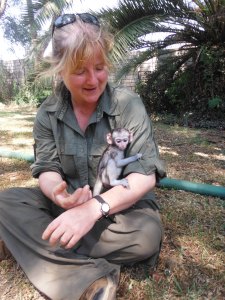
me and my buddy Bandit at Chipangali
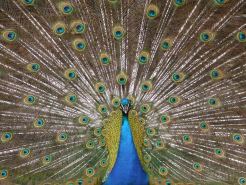
Peacock – ubiquitous at Chipangali, pets left behind by those leaving Zimbabwe
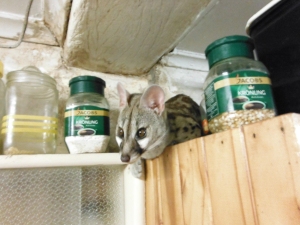
Resident genet at Chipangali
More about Chipangali here
Hanchi:
The Hanchi project in South Africa was probably the most fun! Although it was a fenced property, these reserves are enormous, and animals within them are living a ‘wild’ existence. I got to live my dream of riding out and seeing from horseback giraffe, antelope, even cheetah. The best view in the world in my mind is that through a horse’s ears! I also learnt most here, blessed with a knowledgeable and hilarious volunteer co-ordinator, Elisa, I soaked up her observations and information like a sponge. Here though the highlights included encounters with invertebrates. One memorable night I witnessed a fight between a scorpion and a baboon spider on the way back to my tent. The scorpion won, evicting the hapless female from her beautifully crafted underground sanctuary and using it as a base for hunting termites. I also became enchanted by the resident warthogs. I discovered the most fun you can have in the whole world is to play with three overgrown hand-reared porcines, laughter therapy that money can’t buy. It was at Hanchi that I also got my first close encounter with rhino. The two resident young males, Cupcake and Petal, snorted their way out of the bush to investigate our vehicle, they are big! However, maybe the most profound memories are tracking the cheetah on foot. One mission was to find a cheetah whose radio collar was failing. Elisa and I tiptoed silently through dense bush, and then suddenly I saw the unmistakeable silhouette of two pairs of cheetah ears (siblings Happy and Fluffy) lounging in the shade. I thought my heart would burst. Nothing beats seeing animals in their natural habitat.
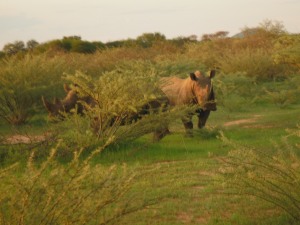
Cupcake and Petal. Rhinos appear to have a somewhat distorted body image, these two feel confident they are hidden behind a handy bush – eyesight isn’t a rhino’s greatest asset!
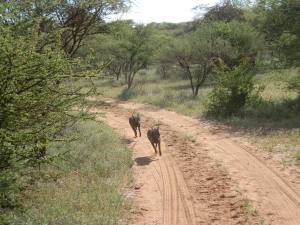
Warthogs are really programmed to follow! These twp were hand-reared after their mother was poached, though free to go anywhere on the property, here they are galloping after their human companions who are driving off in the landrover!
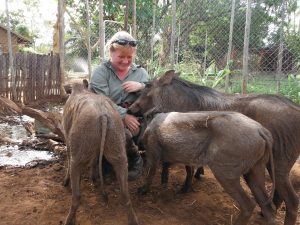
There is no better friend than a warthog
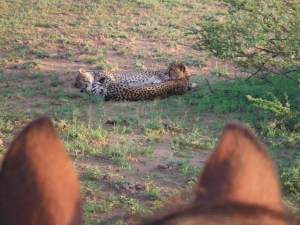
Cheetah boys unbothered being observed from horseback – we just came across them whilst out riding the property
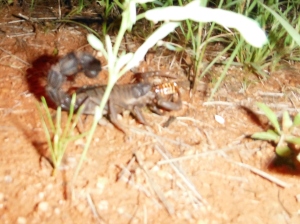
Scorpion, victorious after evicting babboon spider from it’s hole, now hunting termites
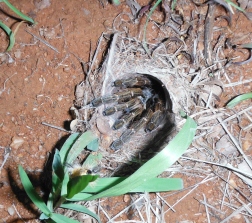
baboon spider emerging from hole to grap bait pray at night
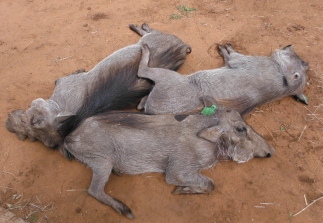
Resting warthog siblings. Incidentally, the reason they were tagged was not to ‘own’ them, but protect them. Habituated to people they were especially vulnerable to poachers, by putting on an ear tag the hope was sensible poachers would stay well clear to avoid attracting attention to themselves. Granted it might be saving ‘our pigs’ at the expense of others, but better a little protection for some, than none for any.
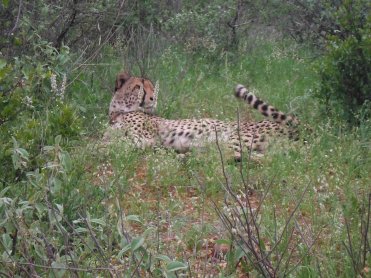
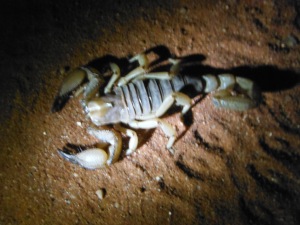
These scorpions were very common at camp at Hanchi, but although they look scary they are pretty benign, Big pincers usually means little sting.
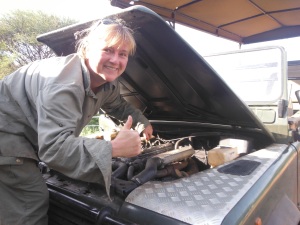
landrover maintenance – what do you mean a staged photo?
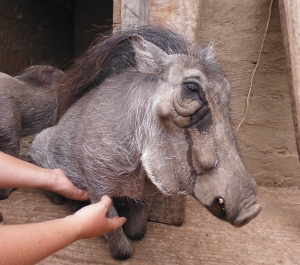
Who knew that if you scratch a warthog between its front legs it makes its mane stand on end. Every time! Awesome.
Read about D-day for Cheetah Conservation here or Hanchi Horsey Reflections here
Mofemedi:
Finally I found myself at the Mofemedi rhino project. This property was truly impressive, stunningly beautiful and vast. It is enclosed, but so huge it has a mountain range across the middle of it. Here the routine was to drive out in the early morning around 5.00 a.m. before it got too hot, and then again in the early evening. The objective was always the same, to try and locate the rhinos and check their presence and their condition – the rains were months late, and animals in alarmingly thin condition. I was fully prepared to go to Africa and never see a rhino; they are after all living a wild existence there. However, part of the mission of this project was to habituate them to the vehicle’s presence to assist with monitoring these highly endangered animals. Over the course of a month we got ever closer. The thrill of seeing a rhino and knowing it is also observing you never diminishes. Seeing a baby rhino gambol is a sight to behold! I learn rhino have terrible eyesight, rather sweetly, sensing your presence they will sometimes hide behind the flimsiest of twigs presuming this has rendered them invisible. They have a seriously inverted body image, the opposite of anorexia I suppose. The rhino are extraordinary, prehistoric, they almost look impossible when you see them up close. It is devastating to think how fragile the population is. The threat of poaching is very real. I learn that on the adjacent property – allegedly a nature reserve, but one without funds to manage it – three rhino were poached last year. In Africa in 2012 668 rhino were poached, this out of a total population for which estimates vary but the higher guess is only 20,000. The gestation period for a rhino is around 16 months, and females are not sexually mature until around 6 years old, but will typically only have one calf every four years. It is not a happy picture. So here the rhino were indisputably the stars of the show, it was amazing to see them, but horrifying to think they could yet become extinct in my lifetime. I hope not, but the threat is very real, which is why programmes like Mofemedi are so needed. When the number of rhino is so very few, protection of each individual becomes imperative for survival of the species as a whole.
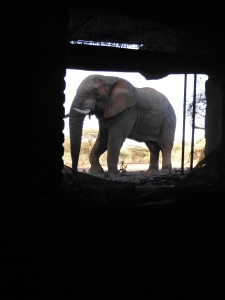
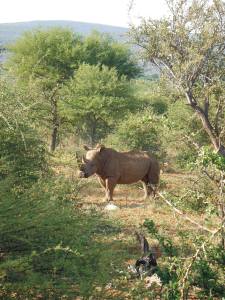
Rhinos are extraordinary
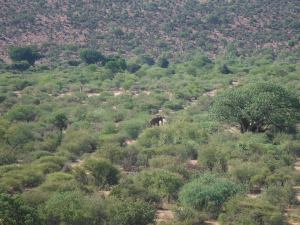
distant elephant – when you see them in their natural habitat you start to appreciate the scale of their territories. To keep such magnificent animals in captivity seems incomprehensible
For a fuller account of Mofemedi click here
Coming home:
So three months flashed by, I saw amazing things, I learned a lot about animals and conservation, but also about myself. I met some great people, shared some wonderful experiences. The reality is that returning to the UK was inevitably a shock. I found myself back in Sheffield, jobless, directionless, middle-aged, facing abject penury and freezing (returning to snow feet deep was not part of the plan), however, I console myself with the fact that that was pretty much where I left off, so really everything went very much as expected! I will get another job, and in the meantime I have memories that will endure for a lifetime. If you reading this are on the cusp of taking the plunge, just do so. I really believe it’s not what we do in life we regret, it’s what we don’t do. Don’t look back and think if only, remind yourself ‘what the hell!’ and step on out!
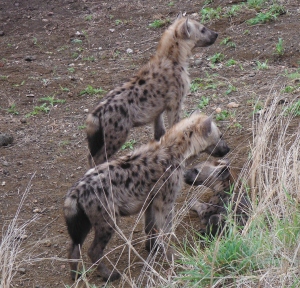
Hyena youngsters at Kruger park – so curious about their world they have abandoned the security of their storm drain hideout to check out the visitors who have stumbled across them
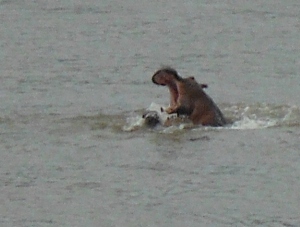
hippos at Kruger

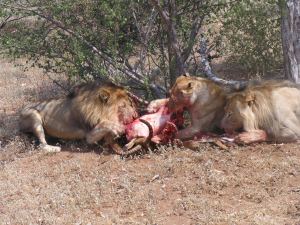
Thanks to the good people of the Umkwali project for making me so welcome and introducing me to their world.

